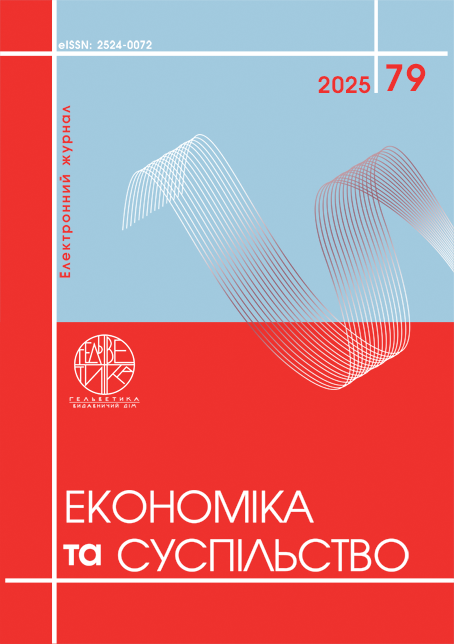DETERMINANTS OF UKRAINE'S ECONOMIC SECURITY AND THEIR IMPACT ON THE DEVELOPMENT OF THE AGRICULTURAL SECTOR IN THE CONTEXT OF INSTITUTIONAL TRANSFORMATIONS
Abstract
The paper is devoted to defining the main determinants of economic security, as well as analysing their impact on the development of the agricultural sector in the context of institutional reforms. It has been determined that the agricultural sector occupies a special place in the state's economic security system, as it ensures food independence, accounts for a significant share of exports, and serves as the foundation for social stability in rural areas. It has been found that an important component of economic security is state support for the agricultural sector, which provides a compensatory effect in periods of geopolitical crises. It was identified that the agricultural sector occupies a special place in the economic security system, as it is a fundamental element of the national economy and a source of food security and rural development. At the same time, institutional reforms, integration into the European market, changes in regulatory policy and structural modernisation of agricultural production create both new opportunities and risks for economic stability. Banks and resource providers provided half of the total financing, while retained earnings/farmers' profits accounted for 40%. It is noteworthy that 20-30% of the harvest was sold before harvesting, which provided farmers with the cash needed to repay loans and purchase resources, thereby reducing their dependence on external financing. On the other hand, the fact that so many farmers sold their crops from the field may indicate difficulties in raising cash through borrowing. About 90% of the funding was directed towards working capital. A comparison of the financing volumes with government expenditure for 2019–2021 indicates the sector's low dependence on public funds. The small share of capital expenditures points to problems with long-term planning in Ukraine and a lack of collateral to secure long-term financing, such as land mortgages. It has also been determined that the financial and economic determinants of economic security are key drivers of the development of agriculture in Ukraine. Access to credit determines investment dynamics, state support determines the level of farmers' resilience to crises, and macroeconomic stability determines the overall environment for long-term growth.
References
2. Лимар В.В., Зверєв О.Д. Наукові підходи до розуміння концепту глобальної економічної безпеки. Бізнес Інформ. 2023. № 3. С. 6-12. URL: https://www.business-inform.net/article/?year=2023&abstract=2023_3_0_6_11 (дата звернення: 29.10.2025).
3. Lymar V.V. Energy security of Ukraine: external threats from the Russian Federation. Yearbook of antitrust and regulatory studies. 2023. Vol. 16(28). P. 31-53. URL: https://press.wz.uw.edu.pl/yars/vol16/iss28/6/ (дата звернення: 29.10.2025).
4. Ji Zhі, Abuselidze G., Lymar V.V. Renewable Energy Sources Based on Agricultural Production: Potential Applications Within the Silk Road Economic Belt Framework. European Journal of Sustainable Development. 2023. № 12. С. 159-179. URL: https://ecsdev.org/ojs/index.php/ejsd/article/view/1381 (дата звернення: 29.10.2025).
5. State Statistics Service of Ukraine. Agriculture of Ukraine 2019, Kyiv. 2020.
6. United States Department of Agriculture. Ukraine Conflict and Other Factors Contributing to High Commodity Prices and Food Insecurity. Washington, DC, 2022.
7. The World Bank Report. Priorities for agricultural support in Ukraine. May 3, 2024. URL: https://documents1.worldbank.org/curated/en/099062524074615884/pdf/P1801981319afe091b8b71b33b7a901d4e.pdf (дата звернення: 29.10.2025).
8. Neyter R., Nivievskyi О. Effect of Subsidies on Farm’s Exit Decision. Journal of Agribusiness. 2023. № 4. С. 941-995.
1. Lymar V.V., Zveriev O.D. (2022) Mizhnarodna ekonomichna bezpeka Ukrainy v umovah posylennia zovnishnih zagroz [Ukraine's international economic security amid growing external threats]. Ekonomika I organizatsia upravlinnia, no 1, pp. 13-25. Available at: https://jeou.donnu.edu.ua/issue/view/422 (accessed October 29, 2025) (in Ukrainian).
2. Lymar V.V., Zveriev O.D. (2023) Naukovi pidhody do rozuminnia kontseptu globalnoi ekonomichnoi bezpeky [Scientific approaches to understanding the concept of global economic security]. Biznes Inform, no 3, pp. 6-12. Available at: https://www.business-inform.net/article/?year=2023&abstract=2023_3_0_6_11(accessed October 29, 2025) (in Ukrainian).
3. Lymar V.V. (2023). Energy security of Ukraine: external threats from the Russian Federation. Yearbook of antitrust and regulatory studies, no 16 (28), pp. 31-53. Available at: https://press.wz.uw.edu.pl/yars/vol16/iss28/6/ (accessed October 29, 2025).
4. Ji Zhі, Abuselidze G., Lymar V.V. (2023) Renewable Energy Sources Based on Agricultural Production: Potential Applications Within the Silk Road Economic Belt Framework. European Journal of Sustainable Development, no 1, pp. 159-179. Available at: https://ecsdev.org/ojs/index.php/ejsd/article/view/1381 (accessed October 29, 2025).
5. State Statistics Service of Ukraine. Agriculture of Ukraine 2019, Kyiv. 2020.
6. United States Department of Agriculture. Ukraine Conflict and Other Factors Contributing to High Commodity Prices and Food Insecurity. Washington, DC, 2022.
7. The World Bank Report. Priorities for agricultural support in Ukraine. May 3, 2024. Available at: https://documents1.worldbank.org/curated/en/099062524074615884/pdf/P1801981319afe091b8b71b33b7a901d4e.pdf (accessed October 29, 2025).
8. Neyter R., Nivievskyi О. (2023) Effect of Subsidies on Farm’s Exit Decision. Journal of Agribusiness, no 4, pp. 941-995.

This work is licensed under a Creative Commons Attribution 4.0 International License.


